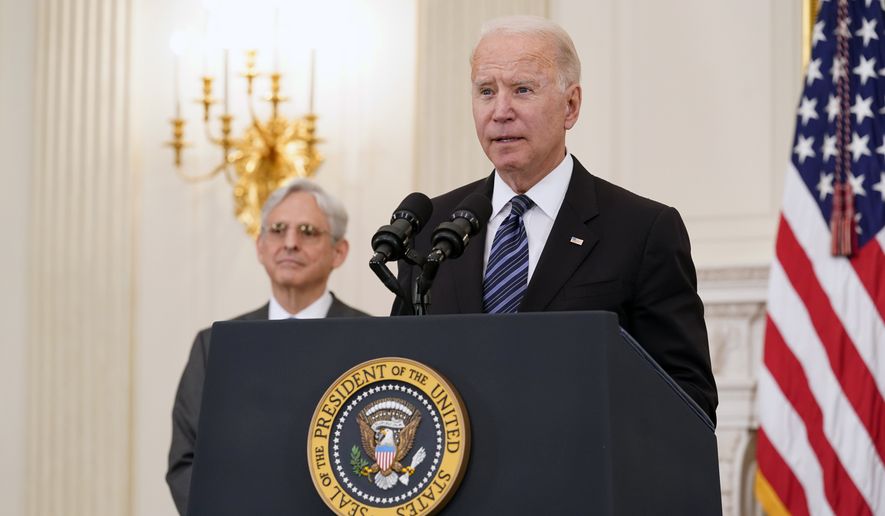The Biden administration on Wednesday said it would more strictly enforce federal gun laws, help cities and states hire more police officers and promote community policing to try to curb an increase in deadly crime as the homicide rate climbs to historic levels in major cities across the country.
President Biden discussed those moves and other pieces of his crime prevention strategy Wednesday at the White House with Attorney General Merrick Garland and several big-city mayors.
Mr. Biden said these proposals will “keep communities safe and people out of trouble. But he also braced the nation for an expected increase in violent crime as summer started this week.
“Crime historically rises during the summer and as we emerge from this pandemic, the traditional summer spike may even be more pronounced than it usually will be,” he said.
Homicides spiked by 30% in 2020 from the previous year, according to data provided by the White House.
The surge shows no sign of abating. In the first quarter of 2021, the nationwide homicide rate was 24% higher than it was during the same period of 2020 and 49% higher than it was in 2019.
Public safety experts expect those numbers will rise this summer with relaxed COVID-19 restrictions and warmer weather bringing people out of their houses. Historically, violent crime spikes during the summer.
Republicans have seized on the issue, using it as a political cudgel to attack Democrats ahead of the 2022 midterm elections.
Mr. Biden’s plan includes adopting a new Justice Department policy that will allow the Bureau of Alcohol, Tobacco, Firearms and Explosives to revoke the federal licenses of gun dealers the first time they violate federal law. Violations could include selling a firearm to a person prohibited, falsifying records, or failing to run a required background check.
The Justice Department also will create five new firearms strike forces to track the illegal flow of guns across state lines. The strike forces will be active in New York, Chicago, Los Angeles, San Francisco and Washington.
Gun-related deaths, including accidents, are up 21% in 2021 with 9,420 Americans killed so far, according to the Gun Violence Archive. That’s on pace to surpass the 19,380 gun-related deaths in 2020, which was the deadliest year in more than two decades. By this time last year, there were 7,795 gun deaths, according to the archive.
There have been 296 mass shootings in 2021, up from 218 during this time in 2020.
James Pasco, executive director of the National Fraternal Order of Police applauded the administration’s proposal, but said more resources are needed at the local level, calling the federal funds “seed money.”
“At some point, the cities are going to have to man up and recognize their responsibility to provide for the safety of the residents those officials represent,” he told The Washington Times. “We applaud the federal government and urge cities and states to assume their responsibilities.”
Mr. Biden also will declare the surge in gun violence is a pandemic-related crisis. That would free up $350 billion in state and local pandemic relief funds approved by Congress earlier this year.
The funds, available under the American Rescue Plan, can be used to hire more police officers, pay officers overtime, buy equipment and fund additional “enforcement efforts” to target the increase in gun violence.
However, those funds must be used for “community policing strategies” and can be used to bolster police department staffs to pre-pandemic levels.
Mr. Pasco said the hiring challenges facing local departments go beyond funding issues. He pointed to officer morale declining as anti-police sentiment continues to rise across the nation.
“There is a great deal of uncertainty to being a police officer today in terms of what constitutes appropriate aggression, personal liability and the like which have a chilling effect to recruit and retain qualified officers,” he said.
Community policing is an Obama-era strategy that encourages departments to build relationships between law enforcement and the communities they serve. The thinking is that those relationships built trust, thereby reducing police brutality and making it easier to solve crimes.
Using pandemic relief money to hire more police officers could touch off criticism by fellow Democrats and social justice groups that have almost unanimously supported Mr. Biden.
Democrats and social justice activists have backed efforts to reduce the size and scope of police officers since the murder of George Floyd in police custody in 2020. They also have pushed to shift law enforcement resources to social programs and replace officers with counselors and social workers.
Mr. Biden has opposed the “defund the police” movement but also has encouraged greater investments in social programs and mental health counseling aimed at reducing crime.
Mr. Biden will announce a new partnership with 15 cities to expand community violence intervention programs through a combination of federal funds and private money from philanthropic organizations. Mr. Biden already had proposed $5 billion for such programs in his infrastructure plan.
The administration also will outline steps to help former inmates enter the workforce. That includes an $85.5 million Labor Department grant to improve former prisoners’ access to jobs in 28 communities. The Labor Department also will evaluate potential barriers to hiring former inmates by the federal government.
In addition, the administration will push to expand summer employment programs and other opportunities for youth and young adults.
• Jeff Mordock can be reached at jmordock@washingtontimes.com.




Please read our comment policy before commenting.